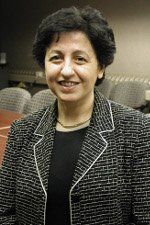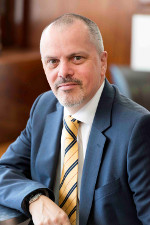Eröffnung
Prof. Dr. Klemens Böhm (Sprecher der Forschungsgruppe, KIT)
Überblick über die Forschungsgruppe und ihre Ziele

Prof. Dr. Klemens Böhm (Sprecher der Forschungsgruppe, KIT)
Überblick über die Forschungsgruppe und ihre Ziele
Prof. Dr. Elisa Bertino (Purdue University, USA)
„Sicherheit und Datenschutz im Internet der Dinge und in Energieinfrastrukturen”
IT‑Infrastrukturen von Energiesystemen (z. B. SmartGrid) sind ein wichtiges Beispiel für das Paradigma des Internets der Dinge (IoT), d. h. es gibt ein Netzwerk von physischen Objekten oder „Dingen”, die mit Elektronik, Software, Sensoren und Konnektivität ausgestattet sind, damit Objekte Daten mit Servern, zentralisierten Systemen und/oder anderen verbundenen Geräten austauschen können. Das IoT ermöglicht es, Objekte zu erfassen und zu steuern, wodurch sich Möglichkeiten für eine direktere Integration zwischen der physischen Welt und computergestützten Systemen ergeben. Aufgrund seiner detaillierten, kontinuierlichen und allgegenwärtigen Datenerfassungs‑ und Steuerungsfunktionen wirft das IoT jedoch Bedenken hinsichtlich der Sicherheit und des Datenschutzes von Daten auf. Der Einsatz bestehender Datensicherheitslösungen für das IoT ist aufgrund der Heterogenität der Geräte, der hochdynamischen und möglicherweise ungeschützten Umgebungen sowie des großen Umfangs nicht einfach. In diesem Vortrag stellen wir nach einer Darstellung der wichtigsten Herausforderungen im Bereich Datensicherheit und Datenschutz erste Ansätze zur Sicherung von IoT‑Daten vor, darunter effiziente und skalierbare Verschlüsselungsprotokolle, Software‑Schutztechniken für kleine Geräte und eine detaillierte Analyse des Datenpaketverlusts für Sensornetzwerke und SmartGrid‑Umgebungen.

Elisa Bertino (Purdue University, USA) ist Professorin für Informatik an der Purdue University und Direktorin des Purdue Cyber Space Security Lab (Cyber2SLab). Außerdem ist sie außerordentliche Professorin für Informatik und Informationstechnologie am RMIT. Bevor sie 2004 an die Purdue University kam, war sie Professorin und Leiterin des Fachbereichs Informatik und Kommunikation an der Universität Mailand. Sie war Gastforscherin am IBM Research Laboratory (jetzt Almaden) in San Jose, bei der Microelectronics and Computer Technology Corporation, an der Rutgers University und bei Telcordia Technologies. Ihre aktuellen Forschungsschwerpunkte sind Datensicherheit und Datenschutz, digitales Identitätsmanagement, Richtliniensysteme sowie Sicherheit für Drohnen und eingebettete Systeme. Sie ist Fellow der ACM und der IEEE. Sie erhielt den IEEE Computer Society 2002 Technical Achievement Award, den IEEE Computer Society 2005 Kanai Award und den 2014 ACM SIGSAC Outstanding Contributions Award. Derzeit ist sie Chefredakteurin der IEEE Transactions on Dependable and Secure Computing.
Prof. Dr. Holger Hanselka (Präsident des KIT)
Die Rolle der Forschungsgruppe innerhalb des KIT
Prof. Dr. Tim Green (Imperial College London, Großbritannien)
„Die Bedeutung der Datenwissenschaft für sichere und kohlenstoffarme Energie“
Kohlenstoffarme Energiequellen, insbesondere Strom, werden in ganz Europa rasch eingeführt und erreichen einen Verbreitungsgrad, der vor einigen Jahren noch als sehr ambitioniert galt. Um mehr stark schwankende Formen der Energieerzeugung zu integrieren, muss das Energiesystem sehr flexibel sein, insbesondere wenn wir ein hohes Maß an Energiesicherheit gewährleisten und die Kosten auf einem angemessenen Niveau halten wollen. In der Präsentation wird erläutert, warum Flexibilität der Schlüssel zu kohlenstoffarmer Energie ist, und es wird diskutiert, welche Rolle die Vielfalt der Energiequellen, internationale Verbundnetze, Energiespeicherung und Maßnahmen auf der Nachfrageseite spielen, um die Flexibilität zu ersetzen, die durch die Stilllegung fossiler Kraftwerke verloren geht. Es liegt auf der Hand, dass die Gewinnung guter Modelle und nützlicher Informationen aus neuen Datensätzen ein wichtiger Schritt sein wird, um die Vielfalt einer großen Anzahl kleiner Energiequellen zu nutzen. Eine vielleicht noch größere Herausforderung besteht darin, die Flexibilität verschiedener Arten und Muster des Energieverbrauchs zu verstehen und Modelle zu entwickeln, die zeigen, wie dieser Energiebedarf in Bezug auf Ort und Zeitpunkt beeinflusst werden kann. Dies ist Teil des Weges von einem System, in dem unflexibler Bedarf durch flexible Erzeugung gedeckt wird, hin zu einem System, in dem Flexibilität überall dort genutzt wird, wo sie vorhanden ist.

Tim Green (Imperial College London, Großbritannien) erwarb 1986 einen Bachelor of Science (Eng) (mit Auszeichnung) am Imperial College London, Großbritannien, und promovierte 1990 an der Heriot‑Watt University in Edinburgh, Großbritannien. Beide Abschlüsse erwarb er im Fach Elektrotechnik. Er ist Chartered Engineer in Großbritannien. Bis 1994 war er Dozent an der Heriot‑Watt University und ist heute Professor für Elektrische Energietechnik am Imperial College London, stellvertretender Leiter des Fachbereichs Elektrotechnik und Elektronik sowie Direktor des Energy Futures Lab. Sein Forschungsinteresse gilt der Gestaltung der zukünftigen Form des Stromnetzes zur Unterstützung einer kohlenstoffarmen Zukunft. Ein besonderes Thema ist die Frage, wie die Flexibilität der Leistungselektronik und Steuerung genutzt werden kann, um neue Erzeugungsmuster und neue Formen der Last, wie z. B. das Laden von Elektrofahrzeugen, als Teil des entstehenden Smart Grids zu berücksichtigen. Sein besonderes Interesse gilt Offshore‑Gleichstromnetzen und dem Management von Niederspannungsnetzen. Er leitet das HubNet‑Konsortium von acht britischen Universitäten, das die Forschung im Bereich kohlenstoffarme Energienetze koordiniert, und ist Network Champion für die Research Councils UK.
Empfang mit Speisen und Getränken sowie Posterpräsentationen der Forschungsgruppe